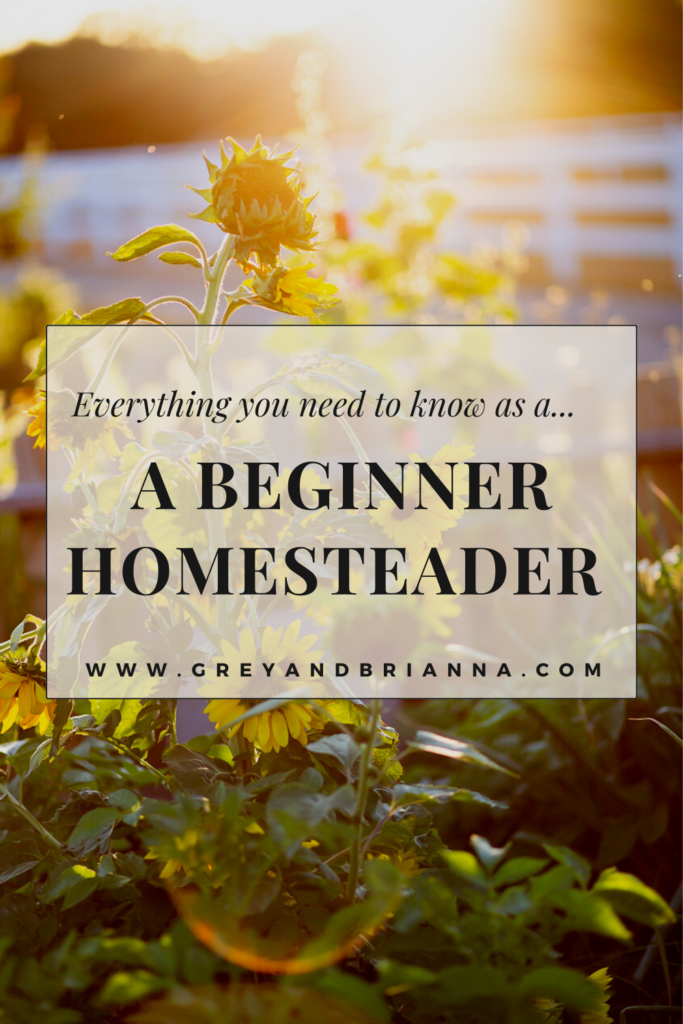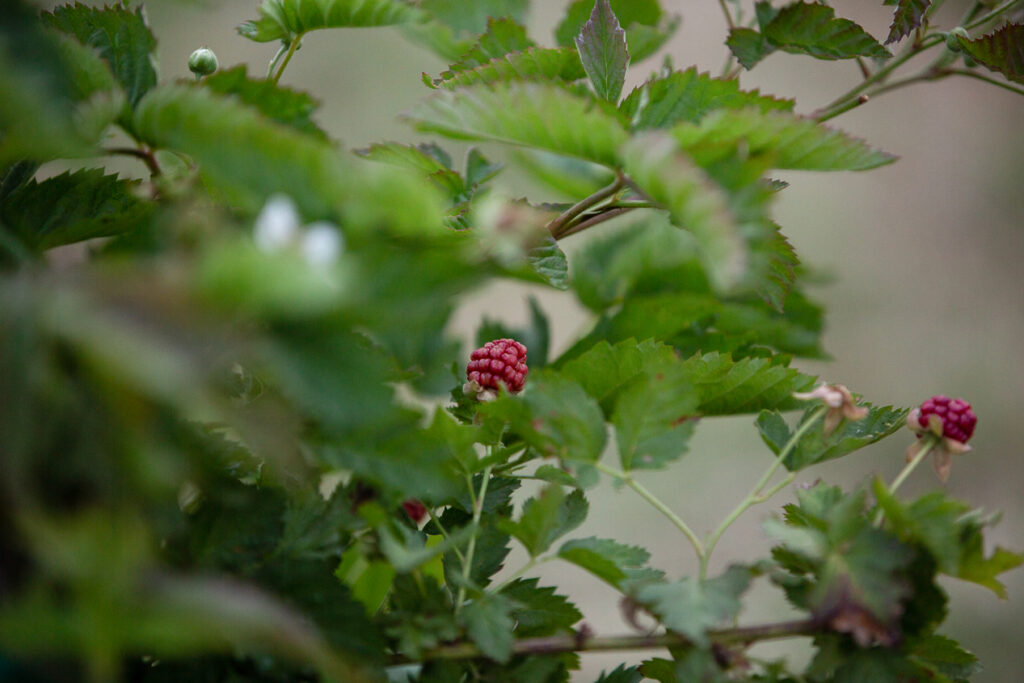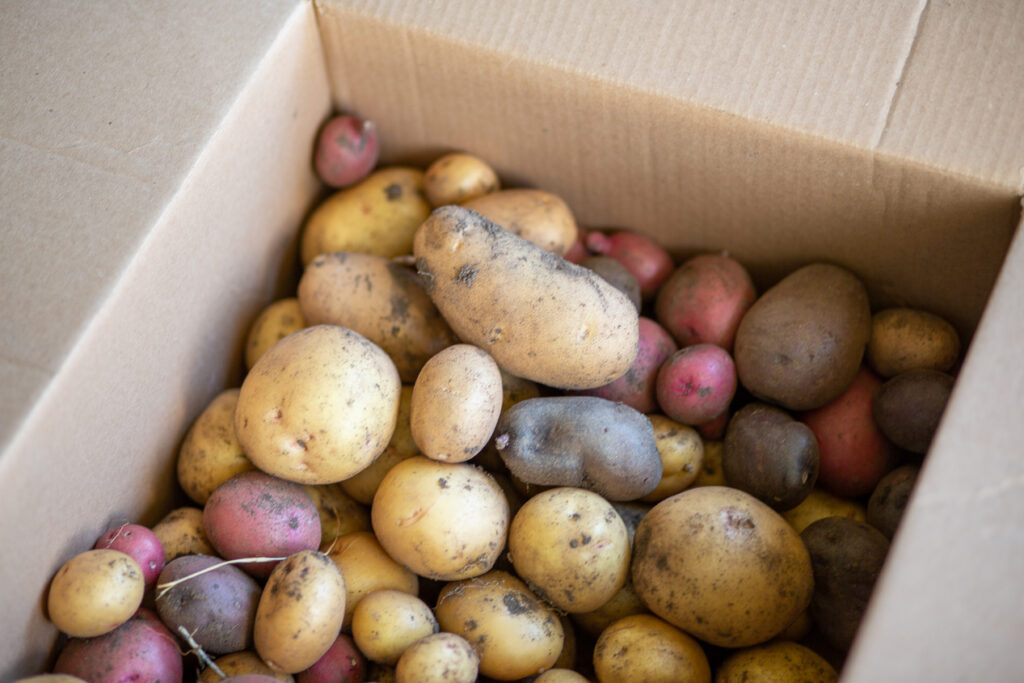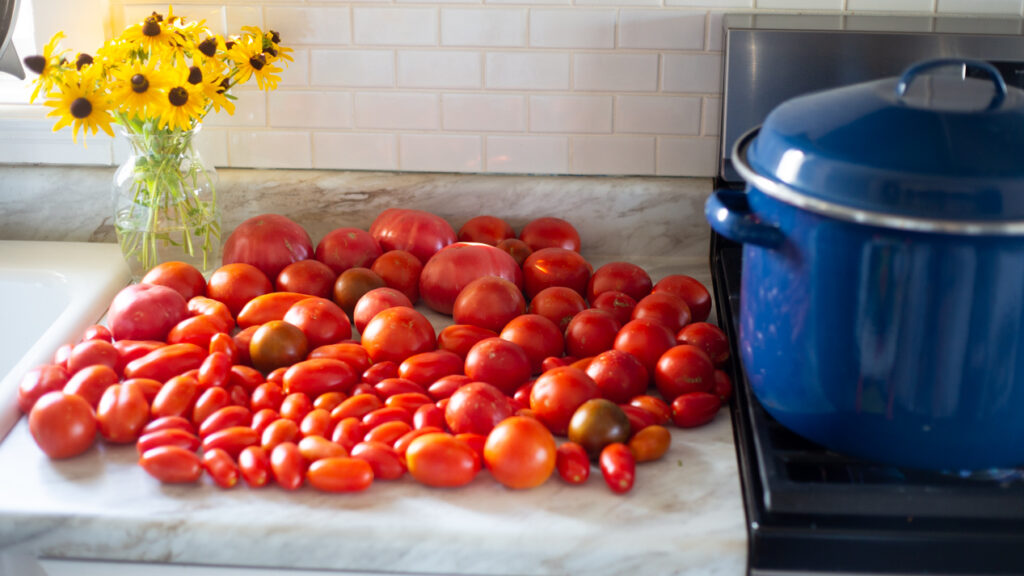Homesteading for beginners can be an intimidating venture. Learn a few key insights that will make the process a lot easier.

This post contains affiliate links which means I make a small commission at no extra cost to you. See my full disclosure here.
Understand What a Homestead Is
There is a definitive definition of homesteading, according to dictionary.com, which is: “a dwelling with its land and buildings, occupied by the owner as a home and exempted by a homestead law from seizure or sale for debt.” OR “any dwelling with its land and buildings where a family makes its home.” OR “a tract of land acquired under the Homestead Act.” However it is used more loosely in today’t modern conversations.
Not only that, there are different sub-groups groups within the homesteading community.
- Rural-traditional country life that typically have zones for gardening, orchards, and a variety of animals at their primary residence.
- Urban- a homestead with a small yard, and want to make the most of it by vertical gardening and raising small animals within town and city limits.
- Prepper- is like rural homesteading however there is an underlying current of preparing for something to happen versus rural living as a way of life.
- Survival-typically have a much bleaker view of the future, hence the name “survival.” They often have a military or outdoorsman background and are prepare themselves both mentally and physically for a potential disaster.
To learn more about what homesteading is and have a more in depth definition of these various sub-categories ready our “what is homesteading” article HERE.

Research what you are interested in raising
It might seem obvious, but the first step is learning a little more about homesteading through reading books, articles, or watching videos. Diving into the homesteading life through other people that have lived it before can be a great resource. Start building your own homesteading resource library to teach you lost skills and art farms to turn back the clock towards a more old fashioned life.
Keep in mind, however this ONLY a jumping off point for each of your new homesteading skills. Most knowledge when it comes to homesteading happens with hands on experience. The failure and success of each project will guide you in what you will raise in the future and what you will not.
This should be flexible and change overtime. It is a good idea to practice doing a quarterly, or yearly review of what worked and what didn’t.
To get started, pick something and jump in by setting small goals for yourself.

Set goals for yourself
Setting goals are like little missions that will propel you and guide your steps into the future. Depending on your individual reason for homesteading this can vary widely between people. To help set goals for yourself think in terms of categories.
Land
What do you want your land to look like? Are you making the most of what you have, or do you intend on moving in the future to further your homesteading goals? This is an important goal to have in mind going forward, because it will determine the skills that you intend on obtaining.

Skills
This is the bread and butter of modern homesteading regardless of what your ultimate goal is. You’ve got to learn these lost skills to help you live a more self-sustainable life. Understanding that this happens over time. focus on one or two skills that you want to learn.
When you feel comfortable with that skill then move onto the next. Many homesteading skills work together and build off of one another. For example milling your own flour is a part of learning to bake your how bread. Homesteading for beginners really is as simple as picking a skill that assists a long term goal and mastering. Rinse and repeat.

Community outreach
Once you have made yourself more handy and valuable to the people around you, you may consider reaching out to community. In many homesteading for beginners articles their is a lot of emphasis on going off grid and becoming more “self-sufficient.”
Although you can become MORE able to do things on your own, it is highly unlikely that you will be able to provide for ALL of your needs completely alone. That is where building community is a highly valuable resource to anyone wanting to step away from the mainstream systems.

Homesteading for beginners means starting small
It is extremely tempting when you’ve been bitten by the homesteading bug, to go all out. This is almost a guarantee for failure. It is not likely that you will go from living a mainstream life to living in an off-grid cabin to producing your own food and goods, all overnight. Start small right where you are. There are SO MANY homesteading skills that do not require any land. Start building and over time work you way up. Here are some common entry skills that you could consider:
Backyard chickens
Keeping chickens has long been known as the “gateway drug” to a homesteading lifestyle. If you have the capacity to raise a few hens for egg production learning to keep chickens is a great way to raise protein right in your own backyard. They are fairly easy to raise, and cost effective when you compare to pasture raised eggs.

Small Garden
Growing anything is a great way to get your feet wet into the gardening world. Most people have room for at least growing herbs on a window sill or a patio tomato. If you’ve got the space, consider growing a few raised beds and start from there. Our first garden in 2010 was ONE raised bed. Now our garden takes over 1/4 of an acre. Just learn the principles and build from there.

Cooking from Scratch
Homesteading for beginners may mean you just learn to cook. Many people do not consider cooking from scratch as an large homesteading skills, but it is actually one of the MOST essential! What is the point of growing amazing food, if it isn’t prepared?! If you’ve got access to a kitchen you can start baking your own bread instead of buying it or simply, making Spanish rice from scratch instead of buying a box mix. All of these things count.

Canning
Canning is a common skill people think about when thinking about old fashioned living, and rightly so. It is a preservation method that has been used for years. If you are specifically interested in learning to can and you are a complete beginner hop over to our article how to get started canning for beginners. Keep in mind that you DO NOT need to be growing your own food to can. In the future that may be the goal. For now just learn to can with store-bought produce. If you need some ideas for where to get produce for canning read THIS ARTICLE.

Sewing and mending clothes
Sewing and mending clothes is an extremely valuable skill if you want to live more self-sufficiently. Learning to sew a button, or patch a hole, can save a garment. Especially if you are homesteading with children, clothes can really get beaten up!
Continue learning homesteading skills
Some skills you may want to consider in the future that are less common in the homesteading for beginners world are:
Beekeeping
Not only does beekeeping provide honey to sweeten your home-made foods, it also is beneficial for your home orchards and gardens. Keeping bees on the property may boost food production and make a happier space around your home.

Raise your own meat
After you’ve got the hand of raising your own eggs, you may be interested in raising meat. This does require a different skill set, but is worth the effort. Again it is a good idea to start small by raising meat chickens, turkey, or rabbits before larger animals like sheep and cows. Raising and caring for the animals is one skill set and butchering is another.
Butchering
Learning to butcher an animal isn’t necessary since there are butchers for hire. It may be something you want to learn, just to have the skill. If you know how to properly butcher an animal you will be equipped to process meat whether you raised it yourself or hunted it.

Compost Tea
Learning to brew compost tea is one of those skills that will take your garden to the next level. It isn’t necessary in the beginning however, it is something to consider learning how to do, if you aren’t getting the yield you would like from your garden. If you are interested in learning more about compost tea, check out our article on what is compost tea, and how to make it.

Make friends with other homesteders
If you are a beginning homesteader it might be a good idea to make friends with like minded people. This can be cone virtually or in person. In person is best of course because it is the kind of community that you can count on to trade goods and services with. Local friends who are also homesteaders make a self-sustainability plan more feasible.
Of course, is a lot of benefits to forming friendships with other homesteaders online as well. Online homesteading friends can be a great source of encouragement and inspiration!

Stay motivated homesteading
Everything is fun and exciting when it is new. It is important to realize, if you want to homestead, that things can get dull quick. Homesteading for beginners, in many ways, is coming up with an action plan when it isn’t fun anymore (believe it or not, homesteading isn’t always fun!) When animals die, or the garden isn’t producing, have a plan to stay motived. We wrote an article about how we personally stay motivated to homestead when times get tough. This is an important thing to think through in any new homesteader’s journey.
You can do this. One skill and one step at a time!
Pin it for Later!

If you liked homesteading for beginners, You May Also Like:
How to Get Started Canning for Beginners
How to Be More Self-Sufficient
Ideas for What to Have on a Homestead: Homestead Planning
Pantry Inventory List to Boost Food Security
How to Enjoy Gardening When it’s Not Your Thing

Fed up with the fast paced modern world, Grey & Brianna made drastic changes to live slowly and intentionally. Read more about their unlikely story back to calm. If you want to send Grey & Brianna a quick message, then visit their contact page.

Leave a Reply